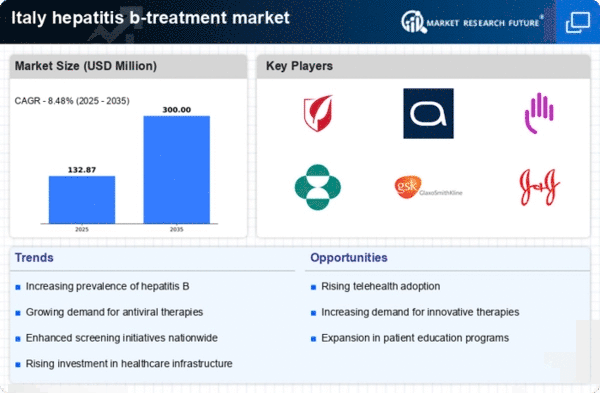Growing Awareness and Education
Growing awareness and education regarding hepatitis B are essential drivers of the hepatitis b-treatment market. Increased public knowledge about the risks associated with hepatitis B and the importance of early treatment is leading to higher screening rates. Educational initiatives by healthcare organizations and non-profits in Italy are effectively informing the public about the disease, its transmission, and available treatment options. This heightened awareness is likely to result in more individuals seeking medical advice and treatment, thereby expanding the patient base for the hepatitis b-treatment market. Additionally, healthcare professionals are receiving more training on hepatitis B management, which may improve patient outcomes and adherence to treatment protocols. As awareness continues to grow, the market is expected to benefit from an influx of new patients.
Rising Prevalence of Hepatitis B
The increasing prevalence of hepatitis B in Italy is a critical driver for the hepatitis b-treatment market. Recent estimates indicate that approximately 0.5-1.0% of the Italian population is chronically infected with hepatitis B. This rising incidence necessitates effective treatment options, thereby propelling market growth. The Italian healthcare system is focusing on improving access to antiviral therapies, which are essential for managing chronic hepatitis B infections. As awareness of the disease grows, more patients are seeking treatment, further stimulating demand in the hepatitis b-treatment market. Additionally, the Italian government has implemented various public health initiatives aimed at reducing the burden of hepatitis B, which may lead to increased funding for treatment options and research, ultimately benefiting the market.
Government Initiatives and Funding
Government initiatives and funding play a pivotal role in shaping the hepatitis b-treatment market. The Italian government has recognized hepatitis B as a public health priority, leading to increased investments in screening and treatment programs. For instance, the National Health Service (NHS) allocates substantial resources to hepatitis B management, which includes funding for antiviral therapies and patient education. This financial support is crucial for enhancing access to treatment, particularly for underserved populations. Moreover, public health campaigns aimed at raising awareness about hepatitis B are likely to contribute to early diagnosis and treatment, further driving market growth. The commitment of the Italian government to combat hepatitis B is expected to create a favorable environment for the hepatitis b-treatment market.
Advancements in Treatment Protocols
Advancements in treatment protocols for hepatitis B are significantly influencing the hepatitis b-treatment market. The introduction of new antiviral medications, such as tenofovir and entecavir, has improved treatment outcomes and reduced the risk of liver complications. These advancements are supported by clinical guidelines that recommend early intervention and long-term management strategies. In Italy, healthcare providers are increasingly adopting these updated protocols, which may lead to a higher treatment uptake among patients. Furthermore, the Italian Medicines Agency (AIFA) has been proactive in approving innovative therapies, which could enhance the therapeutic landscape for hepatitis B. As a result, the market is likely to experience growth driven by the availability of more effective treatment options.
Technological Innovations in Treatment Delivery
Technological innovations in treatment delivery are emerging as a significant driver for the hepatitis b-treatment market. The integration of digital health solutions, such as mobile health applications and telehealth services, is enhancing patient engagement and adherence to treatment regimens. In Italy, these technologies are being utilized to facilitate remote consultations and monitoring, which can improve access to care for patients in rural areas. Furthermore, advancements in drug delivery systems, such as long-acting injectable formulations, may offer more convenient treatment options for patients. These innovations are likely to transform the landscape of hepatitis B management, making it easier for patients to receive timely and effective treatment. As technology continues to evolve, the hepatitis b-treatment market may experience substantial growth driven by these advancements.
















